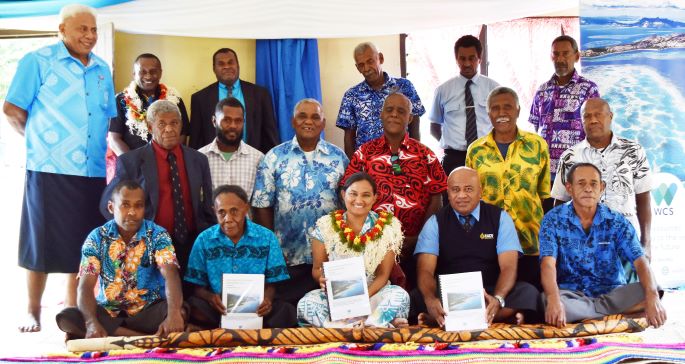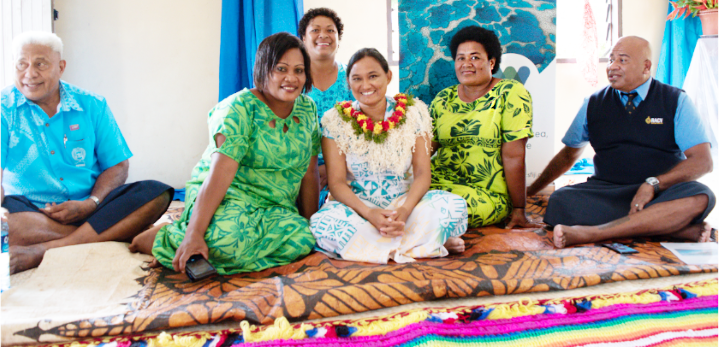This month, with support from the Wildlife Conservation Society (WCS), the Lomaiviti Provincial Office and key Government Ministries the 14 chiefs of the 14 villages of Koro Island launched the ecosystem-based management plan (EBM). This is a first island scale EBM plan for Fiji which is an integrated approach into managing the island’s resources sustainably.

Launch of the island-scale ecosystems-based management plan on Koro Island. © WCS
In endorsing the five-year plan, the chiefs have urged the communities to make every effort to ensure effective implementation of the plan. The plan was designed by the Yaubula Management Support team on the Island through the various community and stakeholder consultations were undertaken between 2015 and 2018. The plan reflects the outcomes of the Koro Island EBM management planning workshops conducted on the island with local communities and relevant government representatives.
WCS, Community Engagement Coordinator, Akanisi Caginitoba, said, “the plan united the 14 villages of the island who have shown great commitment to protecting their vulnerable resources for the future.”
The management plan seeks to promote an integrated approach to enhancing the ecological value and resilience of terrestrial freshwater, coastal and marine ecosystems on Koro island. EBM aims to maintain ecosystems in a healthy, productive and resilient condition so that human needs can be met in future. Local communities are key to sustaining the ecosystems and this plan seeks to address the growing challenges of Fiji's land and marine resources including the impacts of climate change.
The people of the Koro island have committed their time and expertise in abundance to support the conservation and sustainable use of the island's natural resources. The main source of income for the Koro Islanders is farming and fishing. As such, they have identified several threats to Koro Island which if unmanaged, will impact the health of terrestrial and freshwater habitats.
.png?ver=2020-03-10-223336-327)
Signing of the plan. © WCS
It has been identified that uncontrolled logging and agricultural practices have caused the loss of native plant species and increases the presence of invasive species on the Island. To address this threat, the farmers have collectively agreed to not bring in plants such as taro from outside Koro Island.
At a workshop in 2017, held at Vatulele village, it was also noted that unsustainable fishing practices such as overfishing of living resources, night spearfishing and fishing of small-sized fish posed threat to the marine ecosystem surrounding the Island.
The WCS Fiji Country Program Director, Dr. Sangeeta Mangubhai said, “Over the four years of our working here we have seen the best of what Koro Island has to offer through her people and the abundant resources both on land and in the sea.”
While speaking at the launch, she also added that WCS witnessed the heartache brought about by TC Winston and how resilient the people of Koro are and how they have quickly recovered from the devastation brought by TC Winston.
According to the management plan, the communities will have restricted logging near streams, catchment areas and along the coastline. Commercial logging will only commence with approval from the respective Ministry and landowners after an environmental impact assessment.

Women of Koro Island at the launch of the island-scale ecosystems-based management plan. © WCS
Additionally, the communities will establish community-based marine managed areas to counter depleting marine resources. Fish wardens of the communities will monitor the fishing activities and any breach will be reported to the Island's Yaubula Management Support Team. The plan prohibits leaving fishing nets along the mouth of streams, removing the coral, leaving nets overnight and taking of undersized fish.
As part of a longer-term initiative, the communities have also incorporated sustainable financing in the management plan which will help formulate scholarship for tertiary students and small sustainable projects within the Island.